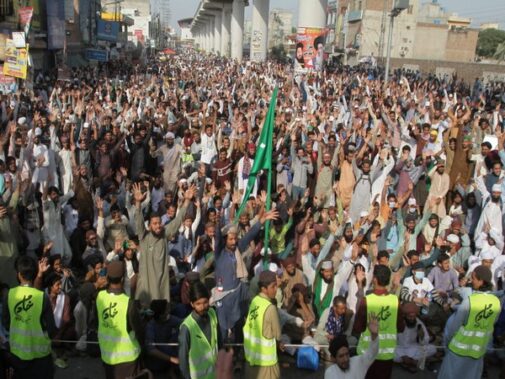 Pakistan: TLP blockade causes disruptions. Image credit: ANI.
Pakistan: TLP blockade causes disruptions. Image credit: ANI.
The assassination of Punjab Governor Salman Taseer by his own bodyguard, Mumtaz Qadri, in January 2011, marked a turning point in Pakistan’s politics. This act of violence opened up a new chapter in Pakistan’s politics, wherein blasphemy laws and religious emotions serve as the foundation of a fully organised political movement, which terrorises the state.
Qadri, a supposed member of the elite police, shot Taseer for having publicly mocked Section 295-C of the Penal Code, a notorious provision that calls for the death penalty for blasphemy against the Prophet Muhammad P.B.U.H, and for going to the defence of Asia Bibi, a Christian woman charged under the same law. While the state executed Qadri in 2016, his funeral was attended by tens of thousands of people, turning him into a martyr in the eyes of religious hardliners. His tomb in Rawalpindi has since become a pilgrimage site for those who judge him to be justified for “defending the honour of the Prophet”.
From this explosive background, Khadim Hussain Rizvi, a preacher in a wheelchair and known for his fiery sermons, went on to found Tehreek-e-Labbaik Pakistan (TLP) in 2015. He set his movement on the pedestal of the Qadri legacy, committing to resist any alteration to the law of blasphemy. Under Rizvi, TLP perfected mass street protests, paralyzing sit-ins, and ceaseless campaigns that branded any call for reform as betrayal of Islam.
The leadership moved onto his son Saad Hussain Rizvi after Rizvi passed away in 2020. Younger Rizvi was proclaimed unable by many to recreate his father’s magic, but the TLP entered into unprecedented strength. In the 2024 general elections, TLP won nearly 2.9 million votes, rising to the fourth-largest party nationally and the third in Punjab.A remarkable leap for a party born no more than a decade earlier.
The blasphemy law as a political weapon
Section 295-C was included in the penal code of Pakistan during the Islamisation drive imposed by General Zia-ul-Haq in the 1980s. Advocates of this blasphemy law consider it a need for the protection of the religious sentiments of a deeply religious society. This, however, has been the theory. The law is vague, easily manipulated, brutally effective in its enforcement, and catastrophic in its consequences.
Many have been attacked or lynched by mobs even before their case reached the courts. Human rights activists long had been demanding reform, noting that the law places entire communities of Christians, Hindus, Ahmadis, and even moderate Muslims under constant threat. But the political cost of reforming it has always been too intolerable for any government.
TLP’s politics of coercion
This has created a fierce atmosphere which TLP organised into a political movement. Thousands of its party members have shut down streets whenever the government hinted at reforms or an incident arose that was perceived as offensive. Their sit-ins brought cities to a standstill, economies to their knees, and turned the government into a beggar in negotiations.
The dynamics created by such events have formed a really dangerous precedent. Rather than strengthening institutions, governments have given credence to street power in their dealings with the TLP. The TLP has thus benefited twofold from each of its street movements: it gets its demands addressed and has ever-increasing strength underwritten. The message is loud and clear: in Pakistan, blasphemy politics can kneel down the state.
As an answer this is very little.
- The political normalisation of extremism: The rise of TLP has mainstreamed religious populism from a fringe to the major political space.
- Rule of Law Erosion: Blasphemy allegations have an otherwise potent capability in politics as instruments passing over judicial tribunals.
- Stifling of Dissent: Reformers and critics from the political parties like Taseer to lawyers and journalists are bombarded with threats, exile or worse.
- Growing Intolerance: Minorities and vulnerable groups live under constant threat, while Pakistan’s international reputation suffers.
This is a reality that was made stark in December 2021 when a mob in Sialkot lynched the Sri Lankan factory manager Priyantha Kumara over blasphemy allegations. His body was set ablaze in broad daylight, while hundreds filmed the brutality on their phones. The lynching sparked global outrage, including in Sri Lanka, one of Pakistan’s allies. It exposed the lethal mix of religious zeal, mob vigilantism, and state weakness. Arrests ran into the dozens, but the event portrayed the ease with which accusation replaces evidence, making visible how mob violence looms over the justice system.
A shadow over Pakistan’s future
The legacies of Salman Taseer’s murder, glorifying Mumtaz Qadri, the rise of TLP with Khadim and Saad Rizvi, and the horrors of incidents like that of the Sialkot lynching tell a hard truth: blasphemy laws have ceased to be just provisions in the law. They have morphed into political instruments, mobilisation tools, and symbols of power.
Ending this cycle will not be easy. Reform of 295-C is politically dangerous, but without reform, Pakistan risks deeper polarisation and approaches closer toward mob justice and increasingly fragile democracy.
Pakistan faces a stark choice: continue down a path where outrage and coercion dictate policy, or reclaim the republic by restoring the courts and parliament as the only arbiters of law. The shadow of Taseer’s murder and tragedies like Sialkot linger on, and whether the country will face or yield to them in the end will define the future of its democracy.
The post Pakistan’s Blasphemous Politics first appeared on Dissident Voice.This post was originally published on Dissident Voice.